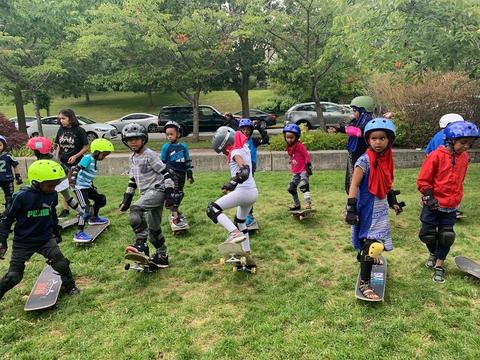When I ask Fardowsa Ali, the Program Director for East African Community Services (EACS), what kids are most excited about this summer, she pauses. “Well, everything! They get to design it. When the program starts, we survey the kids to determine what they want to do.” This summer, kids are going to places like the Microsoft campus, Cougar Mountain, the Pacific Science Center, and the Woodland Park Zoo for field trips. They’re also having field days in the park and learning from the community partners that drop in to their program space in Seattle’s NewHolly Housing Community. Fellow Best Starts for Kids Out-of-School-Time grantee Geeking Out Kids of Color (GOKiC) has partnered with EACS to provide robotics and engineering education. Fardowsa has been really grateful for the instructors, saying that they made a point to check in with the kids and determine if the program was meeting their needs. “They paused to regroup, and came back with activities that were updated to be more culturally relevant.”

Cultural relevance is a central part of EACS’ model. Every day, they bring in a different community member, including parents of participants, as part of the mentoring program and do a presentation on their career. The guests are always a person of color, and often an immigrant, which ensures that their stories resonate with the kids in the program. And the program participants absolutely do see themselves in each and every career they’re exposed to. They’ve seen people with jobs like mental health nurse, poet, engineer, police officer, and prosthetics technician. Fardowsa laughs and says, “for the rest of the day, every kid talks about how they’re going to be a poet when they grow up. The next day it’s an engineer. Even parents are excited about the guest and comment on our Facebook page, trying to see who’s coming that day.”
The staff are similarly excited about the summer program, with the flexibility that comes with longer program hours and no homework assignments. They’re working hard to give kids opportunities to plan (like the initial survey), and to build skills through all of the project-based learning they offer. The goal for the summer, that kids are ready for the next grade, seems simple but it’s actually an uphill battle. EACS includes academic enrichment activities to ensure they combat summer learning loss, which disproportionately impacts youth in low-income communities. They also work hard to ensure that it’s more engaging than school-year style academics.
“I know where I come from. And I’m proud of that. I’m proud of who I am.”
East African Community Services Participant
EACS also wants to promote positive cultural identity for the youth they work with. It’s important for kids to be around community members with shared values– recently, a young person wrote about a racist interaction they experienced in their neighborhood. Someone yelled at them to “go back where [they] came from.” The staff member I spoke with was heartened that this young person wrote “I know where I come from. And I’m proud of that. I’m proud of who I am.” While EACS can’t control the racism that their youth are subjected to, the staff have a profound role in promoting the kids’ sense of self and feelings of belonging. It’s clear that the kids here, who sometimes linger in the staff office to chat instead of going outside during free play, know that this is their space
